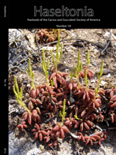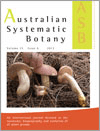
HASELTONIA
metrics 2024
Unearthing Innovations in Succulent Studies
Introduction
HASELTONIA is a distinguished journal published by the CACTUS SUCCULENT SOC AMER INC, focusing on the field of plant science with particular emphasis on cacti and succulent plants. With an ISSN of 1070-0048 and an E-ISSN of 1938-2898, this journal has carved a niche for itself in the academic community, boasting a 2023 Scopus rank of #204 out of 516 in Agricultural and Biological Sciences, placing it in the 60th percentile. HASELTONIA spans several converged years from 2002 through 2024, reflecting its commitment to publishing pertinent and timely research. This journal is recognized for its significant contribution to the understanding and conservation of succulent flora and is classified in the Q2 category in Plant Science, indicating a solid impact in the field. HASELTONIA aims to promote research collaboration, disseminate innovative findings, and foster knowledge sharing among researchers, professionals, and students alike, making it an essential resource for anyone dedicated to the study and appreciation of plant diversity.
Metrics 2024
 0.45
0.45 2.00
2.00 1.30
1.30 16
16Metrics History
Rank 2024
Scopus
IF (Web Of Science)
JCI (Web Of Science)
Quartile History
Similar Journals

TAXON
Exploring the intricate web of life and its evolution.TAXON is a premier international journal published by Wiley, dedicated to the fields of ecology, evolution, behavior, systematics, and plant science. With a distinguished history since 1970 and a commitment to advancing knowledge in the biological sciences, TAXON has been recognized in the Q1 category for both its ecological and plant science contributions as of 2023. The journal boasts an impressive Scopus ranking, placing it in the 76th percentile for Ecology, Evolution, Behavior and Systematics and the 74th percentile for Plant Science, highlighting its significance and impact within these domains. While not an open-access publication, TAXON offers a wealth of high-quality research articles, reviews, and discussions, making it an indispensable resource for researchers, professionals, and students alike seeking to deepen their understanding of biodiversity and systematics. For access to its cutting-edge research, readers can follow the journal's updates and contributions online.

Bradleya
Unveiling the Wonders of Cacti and Succulent HorticultureBradleya, published by the British Cactus and Succulent Society, is a leading journal in the field of Horticulture, recognized for its impactful research contributions. With an ISSN of 0265-086X, this journal operates from the Open University’s Department of Life Sciences in the United Kingdom and holds a prestigious Q1 ranking in Horticulture as per the 2023 category quartiles. With a focus on advancing knowledge in cacti and succulent horticulture, Bradleya provides a vital platform for scientists, horticulturists, and students to disseminate their research and insights. Although it does not operate under an open access model, its significance is underscored by its Scopus ranking as #42 out of 115 within its category, placing it in the 63rd percentile. Authors and readers alike benefit from its rigorous peer-review process and authoritative coverage, making it an essential resource for anyone dedicated to the study of succulent plants.

Journal of Biological Research-Bollettino della Societa Italiana di Biologia Sperimentale
Fostering Interdisciplinary Collaboration in Life SciencesThe Journal of Biological Research-Bollettino della Societa Italiana di Biologia Sperimentale is a premier peer-reviewed journal published by PAGEPRESS PUBL, focusing on a diverse array of topics within the broad field of biological research. Established as an Open Access journal since 2009, it facilitates the dissemination of scientific knowledge across the globe, enhancing visibility and accessibility for researchers, professionals, and students alike. With an ISSN of 1826-8838 and E-ISSN 2284-0230, this journal serves as a platform for innovative studies in Biochemistry, Genetics, and Molecular Biology, with a growing emphasis on Plant Science. Although currently categorized in the Q4 quartile for various sub-disciplines, the journal is dedicated to fostering interdisciplinary collaboration and advancing research quality. The latest Scopus rankings indicate a burgeoning presence in the academic community, positioning itself at significant ranks within the fields it covers. With publication coverage extending from 2011 to 2024, the journal aims to push the frontiers of biological research while adapting to the evolving demands of the scientific community.

FOLIA GEOBOTANICA
Fostering a deeper understanding of our planet's botanical history.FOLIA GEOBOTANICA, published by Springer, is a distinguished journal dedicated to advancing the fields of Paleontology and Plant Science through the dissemination of high-quality research. With an ISSN of 1211-9520 and an E-ISSN of 1874-9348, this journal has been pivotal in providing a platform for innovative studies from 1994 to 2024. Notably, FOLIA GEOBOTANICA holds a Q3 ranking in Paleontology and a Q2 ranking in Plant Science as of 2023, affirming its relevance and contribution to the scholarly community. The journal is located in the Netherlands at VAN GODEWIJCKSTRAAT 30, 3311 GZ DORDRECHT, and is not an Open Access publication, ensuring comprehensive review processes and scholarly integrity. With Scopus rankings that place it in the 50th percentile for Plant Science and 46th for Paleontology, FOLIA GEOBOTANICA continues to attract researchers, professionals, and students who are keen to explore the intricacies of plant ecology and fossil records, thereby fostering a deeper understanding of ecological and evolutionary patterns.

PLANT SYSTEMATICS AND EVOLUTION
Unveiling the Mysteries of Plant DiversityPlant Systematics and Evolution is a prestigious journal published by Springer Wien, dedicated to advancing research within the fields of plant taxonomy, evolution, and ecology. With its ISSN 0378-2697 and E-ISSN 1615-6110, this journal has been pivotal in shaping the scientific landscape since its inception in 1974. Based in Austria, it occupies a significant position in the academic community, being ranked in the Q2 quartile in both Ecology, Evolution, Behavior and Systematics and Plant Science as of 2023. This high-impact journal is recognized for its rigorous peer-review process and is indexed among the top publications in its category, holding a Scopus rank of #176 out of 516 in Plant Science and #252 out of 721 in Ecology, highlighting its relevance and quality in the research community. Although it does not currently offer open access, the journal is committed to making significant contributions to the understanding of plant biodiversity and evolutionary processes. This makes it an essential resource for researchers, professionals, and students aiming to know the latest developments in the study of plant systematics and evolution.

BANGLADESH JOURNAL OF BOTANY
Advancing Botanical Knowledge in BangladeshBANGLADESH JOURNAL OF BOTANY is a prominent publication in the field of plant sciences, dedicated to advancing research and knowledge within the botanical community. Published by the BANGLADESH BOTANICAL SOC, this journal serves as a vital platform for researchers and scholars seeking to disseminate their findings related to plant biology, ecology, and conservation practices, particularly within the unique context of Bangladesh's diverse flora. With an ISSN of 0253-5416 and an E-ISSN of 2079-9926, the journal encompasses a wide scope of topics, reflecting interdisciplinary approaches in botanical research. Since its inception, with convergence periods from 1996 to 2001 and from 2003 to 2024, it has garnered recognition, positioned in the Q4 category in the Plant Science field with a ranking of #459/516 in Scopus, indicating its contribution to the field despite its developing impact. Operating within Bangladesh, at the UNIV DACCA DEPT BOTANY, the journal provides a crucial insight into the ecological and agricultural implications of plant studies in the region, catering to the needs of academics, professionals, and students eager to engage with contemporary botanical research.

TELOPEA
Fostering Understanding of Plant BiodiversityTELOPEA is a distinguished scholarly journal published by the Natl Herbarium New South Wales, focusing on the rich fields of Ecology, Evolution, Behavior, and Systematics, as well as Plant Science. With an ISSN of 0312-9764 and an E-ISSN of 2200-4025, the journal has been a significant contributor to the understanding of plant biodiversity and ecosystem dynamics since its inception in 1984, with regular publication resuming in 2006 through to 2024. Residing in the beautiful Australian Botanic Garden at Mount Annan, NSW, TELOPEA operates under a Q3 ranking for both Ecology and Plant Science as of 2023, reflecting its relevance and contribution to these critical scientific disciplines. Though it does not offer open access, the journal remains an essential resource for researchers and professionals seeking to contribute to and stay abreast of the latest developments in plant sciences and ecological research. With a commitment to rigorous peer review and the dissemination of high-quality research, TELOPEA stands as a vital platform for advancing knowledge in the realm of plant ecology and systematics.

Gorteria
Inspiring Discoveries in Plant BiodiversityGorteria is a distinguished academic journal published by the Naturalis Biodiversity Center in the Netherlands, focusing on the rich field of plant science. With a publication history that spans from 1988 to 2020 and recently resuming in 2022, Gorteria serves as a critical platform for disseminating research findings, reviews, and insights in botanical studies. Although it is categorized within the Q4 quartile, it aims to elevate the understanding of plant biodiversity and ecology, playing a vital role in fostering academic discourse and encouraging the advancement of knowledge in the field. Researchers, professionals, and students will benefit from its curated content as it contributes to global biodiversity efforts and environmental sustainability. For those seeking to explore the latest discoveries in plant science, Gorteria offers a cohesive blend of rigorously reviewed articles that inform and inspire.

Tropical Plant Biology
Unveiling the Secrets of Tropical Plant LifeTropical Plant Biology is a premier academic journal published by Springer, dedicated to advancing the understanding of tropical plants and their ecological significance. With an ISSN of 1935-9756 and an E-ISSN of 1935-9764, this journal serves as a vital platform for researchers, professionals, and students focused on the fields of Genetics and Plant Science. Notably recognized in 2023 as a Q2 journal in Plant Science and Q3 in Genetics, it ranks 171st out of 516 in Agricultural and Biological Sciences and 227th out of 347 in Genetics according to Scopus. The journal encompasses a diverse range of topics, offering insights into tropical plant biology, ecology, conservation, and biodiversity. Although it does not currently operate under an open-access model, it remains an essential resource for anyone passionate about tropical ecosystems and their intricate relationships. With contributions spanning from 2009 to 2024, Tropical Plant Biology continues to foster scholarly discourse and innovation in the field.

AUSTRALIAN SYSTEMATIC BOTANY
Advancing the Science of Australian FloraAustralian Systematic Botany is a prestigious academic journal dedicated to the field of plant science, published by CSIRO PUBLISHING. Established in 1988, this journal has become a vital resource for researchers, professionals, and students focusing on the systematic study of Australian flora. With an impressive track record and convergence extending to 2024, it operates in the Q3 category for Ecology, Evolution, Behavior and Systematics and Q2 for Plant Science as of 2023. The journal holds significant value in the academic community, given its Scopus ranking, which places it in the 61st and 59th percentiles within its respective categories. Although it follows a subscription-based model, the journal remains committed to advancing knowledge in systematic botany, offering critical insights that shape the future of ecological and biological research both in Australia and globally.